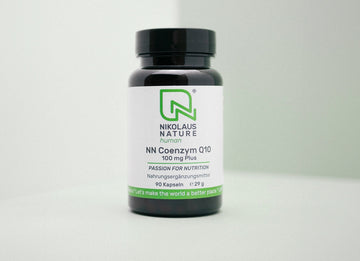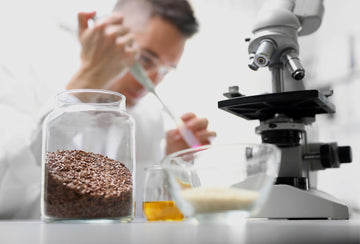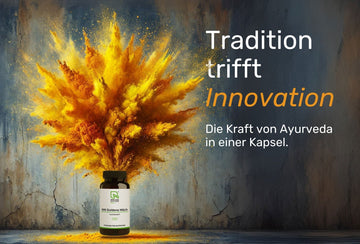Coenzyme Q10 is commonly known from cosmetics. Here, it is said to counteract skin aging, minimize wrinkles, and maintain youthful, radiant skin. But it can do so much more: Coenzyme Q10 plays an essential role in the body's energy production, the immune system, and general health. In this blog post, we explain everything about coenzyme Q10 and when, why, and for whom supplemental intake is beneficial.
Coenzyme Q10 can do more than smooth wrinkles
Without coenzyme Q10, no energy could be produced in the body. It plays a crucial role in the mitochondria—the cells' powerhouses—in providing energy. Coenzyme Q10 is a micronutrient and an important cellular component. As a cofactor, it performs essential functions for the immune system and for neutralizing free radicals. Strictly speaking, however, it is not an enzyme but a vitaminoid. Coenzyme Q10 is fat-soluble, and the human body is able to partially produce it itself in the liver cells. However, it must also be supplied through food to counteract a deficiency.
How does a coenzyme Q10 deficiency arise?
A deficiency of coenzyme Q10 can have many internal or external causes:
- Advancing age: The older you get, the more difficult it is for the body to convert ubiquinone into ubiquinol, and the less effective the body's own production becomes. Coenzyme Q10 levels decline steadily from around the age of 30.
- Taking medication: Cholesterol-lowering medications can block the absorption of coenzyme Q10 in the body.
- Diseases: Diabetes, heart disease or thyroid disorders can have a negative effect on coenzyme Q10 levels.
- If there is a zinc, selenium or vitamin B6 deficiency, the body has difficulty absorbing coenzyme Q10.
- Oxidative stress and high physical exertion: Both ensure that a lot of coenzyme Q10 is used up in the body and the need increases.
- Consumption of alcohol and cigarettes: Too much of these deprives the body of an enormous amount of nutrients – including coenzyme Q10.
- Genetic defects in coenzyme Q10 synthesis or mitochondrial diseases
Other factors include unhealthy diets, weight-loss diets, or competitive sports, which can lead to a lack of coenzyme Q10 in the body. This can manifest itself in the form of lethargy or fatigue due to the lack of energy. Energy levels and performance suffer. Studies have also shown that certain heart and brain diseases, as well as diabetes and cancer, are often associated with low coenzyme Q10 levels. Whether the deficiency causes the diseases or is a consequence of them is currently being researched.
The countless functions of coenzyme Q10 in the body
In addition to its anti-aging properties, coenzyme Q10 has a whole host of other functions in the human body. It not only supplies the entire organism with energy, but also activates the immune system, strengthens the heart and nerves, and promotes fat burning.
Coenzyme Q10 and its original importance for the skin
Since coenzyme Q10 first gained attention as an ingredient in skin creams, it has become widely known as an anti-aging agent. The reason is obvious: The skin must constantly renew and regenerate itself, fight inflammation, and heal. It relies on vigorous cellular activity, which is boosted with sufficient energy by coenzyme Q10. The effects of too many free radicals quickly become visible, especially on the face: The skin becomes pale and lackluster, and premature skin aging becomes noticeable. Coenzyme Q10 in skin care products is said to counteract the aging process and promote a beautiful, well-groomed appearance.
Coenzyme Q10 as an energy supplier
Coenzyme Q10 plays an essential role in the body's energy supply. It ensures that nutrients are converted into energy in the mitochondria. Without coenzyme Q10, there would be no energy in the body. Therefore, particularly high amounts of it are found in areas of the body where a lot of energy is consumed and used: in the heart, brain, liver, and muscles.
Coenzyme Q10 and its antioxidant properties
As a powerful antioxidant, coenzyme Q10 provides important protection for cells. Free radicals are released during every metabolic process in the body. While there's nothing you can do to prevent their release, antioxidants can neutralize them. Radicals accelerate the aging process of cells and can promote premature death by destroying cell membranes and cell components. Coenzyme Q10 has strong antioxidant properties and can capture and neutralize free radicals.
Double importance of coenzyme Q10 for the heart
Coenzyme Q10 is even twofold important for the human heart: first, it's an important energy source, because the heart is the most active muscle, working around the clock. Second, it can contribute to the protection of heart tissue and blood vessels because of its strong antioxidant properties. Therefore, the heart contains high concentrations of coenzyme Q10. Studies suggest that people with cardiovascular-related conditions particularly benefit from an adequate supply of coenzyme Q10.
Important nutrient for nerves, immune system and muscles
But the list of coenzyme Q10's to-do list goes even further. It also performs essential functions in the following areas:
- Nerves: Age-related symptoms related to nerves often have their origins in energy supply. Coenzyme Q10 boosts cellular power plants, which can have a positive effect on the nervous system.
- Immune system: Coenzyme Q10, with its anti-inflammatory properties, can strengthen the immune system. Together with vitamin E, it plays a key role in fighting off viruses and bacteria. It supports immune cells with energy. Who hasn't experienced it: When you feel weak and tired, a cold is usually not far behind. However, if the body has sufficient energy available, it can mobilize its defense mechanisms and accelerate the healing process.
- Muscles & Fat Burning: It goes without saying that muscles—especially in athletes—require a lot of energy. However, when they're operating at full capacity, this also affects fat burning. Coenzyme Q10 is also responsible for providing sufficient energy to the muscles.
Q10 intake through food
Coenzyme Q10 is primarily found in animal products because animals can produce the enzyme themselves. But coenzyme Q10 can also be found in vegetables – albeit in smaller doses. Good sources of Q10 are fish, poultry and beef, as well as broccoli, peppers and spinach. Vegetarians and vegans therefore need to eat plenty of vegetables to meet their needs. Coenzyme Q10 is also sensitive to heat and UV radiation, which means that some of it is lost during cooking. An average diet provides about 25% of the required amount. But even if sufficient intake is achieved, the supply still depends on the body's ability to absorb it.
Does supplementing with coenzyme Q10 make sense?
Coenzyme Q10 can also be taken as a dietary supplement. Due to a variety of internal and external factors, one cannot automatically assume that the body is adequately supplied with coenzyme Q10. The body's ability to produce active coenzyme Q10 can be impaired or inhibited. Therefore, it is better not to rely solely on diet. Because it is a fat-soluble substance, coenzyme Q10 is best taken with some fat or oil – this allows it to be absorbed by the body up to three times faster.
Because coenzyme Q10 is a combination of energy source and antioxidant, supplements are also ideal for athletes. Anyone taking anticoagulant medication should consult a doctor before supplementing due to potential interactions.
General intake recommendations for coenzyme Q10
If coenzyme Q10 is taken for anti-aging care or basic nutrition, a daily dose of between 30 mg and 60 mg is perfectly sufficient. As a treatment, the daily dose can also be between 60 mg and 300 mg. For comparison: 2 kg of sardines contain 100 mg of coenzyme Q10. Studies have shown that coenzyme Q10 is very well tolerated, and that up to a daily dosage of 500 mg, hardly any serious side effects are to be expected. If you are unsure, you can also consult a doctor beforehand. However, it should be noted that in cases of severe deficiency, it can take months for Q10 levels to return to normal.
Coenzyme Q10 offers a wide range of combination possibilities
By combining it with other nutrients, supplementation with coenzyme Q10 can achieve a variety of synergistic effects:
- Vitamin C and selenium are also nutrients with antioxidant properties.
- The combination with magnesium or B vitamins is recommended in cases of exhaustion, as these nutrients can also contribute to reducing tiredness and fatigue.
- If you are focusing on the well-aging effect or general well-being, you can combine coenzyme Q10 with omega-3 fatty acids, zinc or vitamin D.
- Coenzyme Q10 also works synergistically with vitamin E in many processes in the body.
Q10 supplementation – yes or no?
Coenzyme Q10 has become known as an anti-aging agent used to combat wrinkles and skin aging. But it can do so much more. Coenzyme Q10 is a multi-talent for the human body and performs many functions that are of great importance for physical health. With increasing age, the concentration of Q10 in body tissue slowly but steadily decreases. Adults of all ages, as well as athletes, can therefore benefit from supplementing with coenzyme Q10. Especially in old age, coenzyme Q10 supplements can have a very revitalizing effect on the entire organism.












